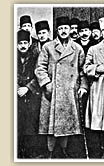
It was then that the convocation of the National Congress in Sebastea was decided, and military decisions were taken regarding the organization of the resistance. The Mustapha Kemal movement, the National
Defence, was by now a fact and its leader was summoning the leading personalities of the capital
to take part in it.
Kemal toured Anatolia and called the Turks to take up the fight against foreigners. He appeared
loyal to the Sultan, whom he considered a prisoner of the foreigners in Constantinople,
unable to react without the mobilization of his people.
The British demanded his dismissal from the army due to his revolutionary activity. Kemal
resigned and went to Erzurum, where the Congress organized by the
Society for the Defence of the Rights of Anatolia took place at the end of July 1919.
This Congress, a preliminary event before the main Congress at Sebastea, recognized Kemal as general
leader, announced the slogan 'Turkey for Turks' and expressed its opposition
to the partitioning of the country. At the same time it continued to declare
its devotion to the Sultan, in his attempt to win over the majority
of the Turkish people.
At the National Assembly of Sebastea on 20 August/4 September 1919 the decisions of
Erzurum were ratified. It was also declared that the creation of a Greek state
in Aydin, Magnesia and Balikesir would not be accepted. Kemal's proposal that they be
represented at the Peace Conference as a nation and not as an Empire was accepted
and these claims were grounded on the declared right for self-determination.
The Sultan's government reacted to the declarations of Kemal by dispatching against
him Kurdish troops, which were repelled. He agreed to the holding of elections
and appointed a pro-Kemalist Grand Vizier. The new parliament of nationalist majority
voted in favour of the National Pact epitomizing the principles of Erzurum and
Sebastea and practically annulled the principles of the terms of the Mudros
armistice.
The capture of Constantinople by the Allies in March 1920,
the dissolution of the Parliament and the declaration of martial law rendered the claims of Kemal
for imprisonment of the Sultan absolutely plausible amd attracted more supporters
to the Kemalist movement. On 10/23 April 1920 the First Grand National Assembly was convened in Ankara; it decided on the formation of a provisional government under the presidency of Kemal.
With the formation of the government in Ankara, Turkey was divided into two
camps. The situation deteriorated into a civil war, as pro-Sultan coups
broke out, possibly under the instigitation of the Allies, which in turn brought about a reaction on the part of the nationalists.
|
